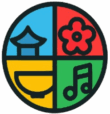Chuseok (추석) is often called “Korean Thanksgiving,” but it’s more than a meal. It’s a homecoming, a time when urban life slows and millions travel to ancestral hometowns. The festival usually falls on a full moon in early autumn, and it blends gratitude for the harvest with remembrance of family roots.
Returning home
Chuseok is about going back to parents, grandparents, and to the hometowns that anchor identity. Trains, buses, and highways are packed. Despite the traffic, the mood is festive. It’s a collective migration that says: we belong to each other.
Honoring ancestors
Many households perform charye (차례), a memorial rite held at home. A table is set with seasonal foods—fruits, fish, rice wine, and traditional dishes—arranged with care. The purpose is not fear or superstition; it’s gratitude, an acknowledgment that we stand on the efforts of those before us.
Taste of the season: songpyeon
The iconic Chuseok food is songpyeon (송편), half-moon rice cakes filled with sesame, red beans, or chestnuts, and steamed over pine needles (which add a fresh scent). Families often make songpyeon together, shaping dough and laughing over imperfect crescents. There’s an old saying that if you make pretty songpyeon, you’ll have a beautiful daughter—half joke, half encouragement to try your best.
Games, clothes, and the harvest moon
Chuseok traditions include hanbok (traditional clothing), folk games like ssireum (traditional wrestling), and visits to ancestral graves (성묘). The full moon symbolizes abundance and completeness; people share hopes for health, love, and prosperity.
Chuseok today
Modern Chuseok adapts: families might skip long rituals, order food instead of cooking, or celebrate with a short trip. What hasn’t changed is the heart of the holiday: gratitude and togetherness. Even in high-rise apartments, the festival reconnects people to seasons, stories, and kinship.
Tips for visitors
- Expect crowds and higher travel prices—book early.
- Try songpyeon from a local market; each region has its own style.
- Many museums and palaces hold Chuseok events—a great window into tradition.
In short, Chuseok is a living tradition. It remembers the past, celebrates the present, and hopes well for the future—under the same bright autumn moon.
